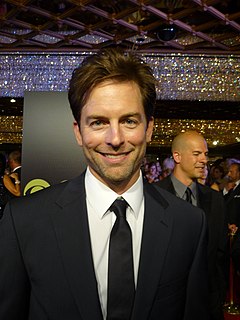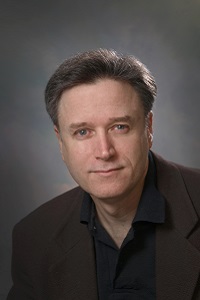A Quote by James Salter
I'm a 'frotteur,' someone who likes to rub words in his hand, to turn them around and feel them, to wonder if that really is the best word possible. Does that word in this sentence have any electric potential? Does it do anything? Too much electricity will make your reader's hair frizzy. There's a question of pacing.
Related Quotes
It is excellent discipline for an author to feel that he must say all he has to say in the fewest possible words, or his reader is sure to skip them; and in the plainest possible words, or his reader will certainly misunderstand them. Generally, also, a downright fact may be told in a plain way; and we want downright facts at present more than anything else.
This word "redemption," what is it about this word? Is it tangible? Do you know when it has happened? Is it necessary in a drama? Does it make a character boring? Does everyone agree on a character being "redeemed?" Or is it a word that is so subjective and polarizing and insignificant in modern television? It is a word that has been given, quite possibly, far too much significance, when it is truly ambiguous and meaningless in a drama. I have personally grown to loathe that word in literature.
We cannot control the way people interpret our ideas or thoughts, but we can control the words and tones we choose to convey them. Peace is built on understanding, and wars are built on misunderstandings. Never underestimate the power of a single word, and never recklessly throw around words. One wrong word, or misinterpreted word, can change the meaning of an entire sentence - and even start a war. And one right word, or one kind word, can grant you the heavens and open doors.
Most people write the same sentence over and over again. The same number of words-say, 8-10, or 10-12. The same sentence structure. Try to become stretchy-if you generally write 8 words, throw a 20 word sentence in there, and a few three-word shorties. If you're generally a 20 word writer, make sure you throw in some threes, fivers and sevens, just to keep the reader from going crosseyed.
Grown-ups love figures... When you tell them you've made a new friend they never ask you any questions about essential matters. They never say to you "What does his voice sound like? What games does he love best? Does he collect butterflies? " Instead they demand "How old is he? How much does he weigh? How much money does his father make? " Only from these figures do they think they have learned anything about him.
With a 660-page book, you don't read every sentence aloud. I am terrified for the poor guy doing the audio book. But I do because I think we hear them aloud even if it's not an audio book. The other goofy thing I do is I examine the shape of the words but not the words themselves. Then I ask myself, "Does it look like what it is?" If it's a sequence where I want to grab the reader and not let the reader go then it needs to look dense. But at times I want the reader to focus on a certain word or a certain image and pause there.
Royce turned to Hadrian. “It’s supposed to make them look tough, but all it really does is make it easy to identify them as thieves for the rest of their lives. Painting a red hand on everyone is pretty stupid when you think about it.” “That tattoo is supposed to be a hand?” Hadrian asked. “I thought it was a little red chicken. But now that you mention it, a hand does make more sense.” Royce looked back at Will and tilted his head to one side. “Does kinda look like a chicken.
Here's a funny question:What is your favorite word?Think about it—maybe it's a word that makes you absolutely happy, or a word that sounds gloriously beautiful, or a word that evokes awe and wonder. Maybe you are reminded of a great time when you hear it, or maybe it represents your life's dream.So, what is it? What is your favorite word of all words?Thought about it yet?Good.And now, think why.
'Fire' does not matter, 'earth' and 'air' and 'water' do not matter. 'I' do not matter. No word matters. But man forgets reality and remembers words. The more words he remembers, the cleverer do his fellows esteem him. He looks upon the great transformations of the world, but he does not see them as they were seen when man looked upon reality for the first time. Their names come to his lips and he smiles as he tastes them, thinking he knows them in the naming.
To me, a poem is almost like someone whispering to another person, or you hear the whispering in your head. I hope with my own poems that the reader feels a connection, soul to soul, that'll help us all feel a little less alone on the planet. And it does have the power to direct change. A writer can make the word 'dark' be something positive. You can relieve a word like 'hysterical' of its misogynistic implications. You can make the language your own. That's what poetry is about.
To anyone who has followed the practice of using profanity or vulgarity and would like to correct the habit, could I offer this suggestion? First, make the commitment to erase such words from your vocabulary. Next, if you slip and say a swear word or a substitute word, mentally reconstruct the sentence without the vulgarity or substitute word and repeat the new sentence aloud. Eventually you will develop a non-vulgar speech habit.
I turn sentences around. That's my life. I write a sentence and then I turn it around. Then I look at it and I turn it around again. Then I have lunch. Then I come back in and write another sentence. Then I have tea and turn the new sentence around. Then I read the two sentences over and turn them both around. Then I lie down on my sofa and think. Then I get up and throw them out and start from the beginning.
Shake off those gloomy feelings. Drive them away. Fix your mind and pleasures upon what is before you.All is bright if you will think it so. All is happy if you will make it so. Do not dream. It is too ideal, too imaginary. Dreaming by day, I mean. Live in the world you inhabit. Look upon things as they are. Take them as you find them. Make the best of them. Turn them to your advantage.
I'm sure there are people in Hollywood, whose main drive in film is to make money, who will feel that any use of the word hijacking or any reference to anything violent or remotely associated with the terrible tragedy that occurred will lose customers for them. And that will be the only criterion that will matter and so they'll force the minions that work for them to remove these things from their movies, or not make movies about that subject.






































